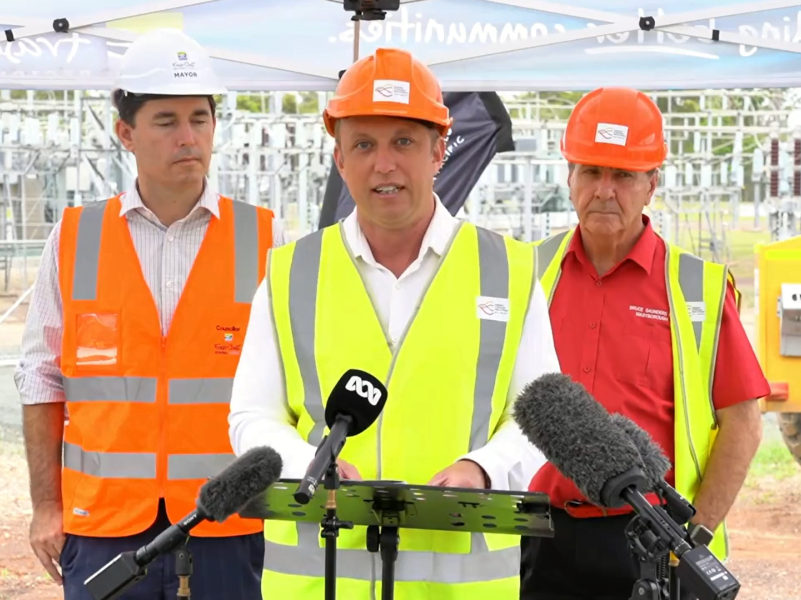Queensland’s battery industry could be worth $1.3 billion to the state’s economy in less than a decade, according to a new discussion paper commissioned to inform Queensland’s first Battery Industry Strategy.
Minister for State Development, Infrastructure, Local Government and Planning Steven Miles announced the discussion paper on Monday, with the strategy expected to be released in mid-2023.
Produced by Accenture, the paper claims the “battery industry has the potential to contribute $1.3 billion in annual gross value-add and produce 9,100 jobs by 2030” in Queensland, highlighting existing competitive advantages in mining, refining to chemicals, and active materials.

To reach this projection, the report states “Queensland should target at least 13-15 GWh of production capacity by 2030, focusing on stationary storage,” a market which will have “37 per cent annual growth across the decade”.
Queensland’s relative strength in research and development across the value chain but particularly in active materials, cell manufacturing, and pack assembly is also a contributing factor, according to the report.
Minister Miles said the government is currently committed to ensuring 70 per cent of the state’s energy supply comes from renewable sources by 2032, with battery storage “absolutely critical” to delivering on this target.
“We don’t just want to be installing those batteries across our grid. We want to be making them here too. And we are already proving that we can here in Maryborough [Energy Storage Industries (ESI)] have their $70 million iron flow battery manufacturing facility are already under construction,” Minister Miles said.
“We’re calling on stakeholders and industry to tell us what they need to make more of the batteries that we need here in Queensland, making them here in Queensland using Queensland workers and Queensland products. What are the settings and supports the industry will need to see more projects like this one.”
Domestic battery demand to 2030 is forecast to be 90GWh, of which 26GWh will be in Queensland. An earlier Accenture report, commissioned by the Future Battery Industries Cooperative Research Centre, put the value of the national battery industry at $7 billion by 2030.
While the discussion paper states that “the most attractive battery value-chain opportunities lie in lithium-ion batteries”, it acknowledges that Queensland has “limited lithium reserves”.
However, the state also holds 28 per cent of the world’s vanadium reserves, which could be converted to around 2,000 GWh of flow batteries.
ESI Asia Pacific managing director Stuart Parry, who joined Mr Miles at the launch of the discussion paper, said the planned Battery Industry Strategy should support a range of battery technologies.
“There’s a few things from when I read it over the weekend that I think could be adapted and changed. Realistically, the energy transition isn’t just [our iron-flow batteries]. It’s not just lithium, it’s going to be a pot pourri of different technologies, a lot of different chemistries,” Mr Parry said.
“Therefore we require everyone, we need everyone to be involved in this to be able to deliver on not only energy transition requirements for here for the state of Queensland, but also for Australia.”
The discussion paper also compares Australia’s current production capabilities across the battery value chain compared to the global picture, with downstream processing and manufacturing dominated by China. Global battery demand is expected to grow tenfold by 2030, when it will reach 2,045GWh.
The paper and planned strategy come less than six months after a 10-year, $62 billion Energy and Jobs Plan for the state was released. At least $4 billion will be committed to the energy transition and renewable energy infrastructure.
This includes $500 million for the development of hydrogen ready gas turbines, and grid and community batteries through the state-owned energy companies.
Federal Labor is also progressing its $70 million election commitment to develop a hydrogen hub in Townsville, calling on producers, consumers and potential exporters of hydrogen to apply for the program on Saturday.
The federal government has also committed to a National Battery Strategy, however no details on the beginning of consultation have been released.
The proposed federal strategy will include a $100 million equity investment in a Battery Manufacturing Precinct in Gladstone, in partnership with the Queensland state government.
Battery industry development will also be supported by the federal government’s 2023 Critical Minerals Strategy, currently undergoing public consultation.
Do you know more? Contact James Riley via Email.

